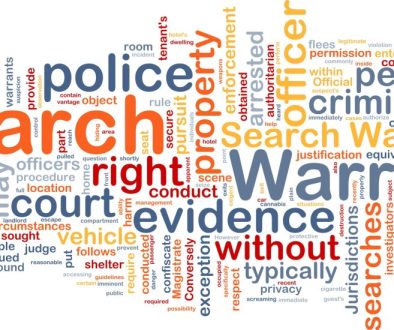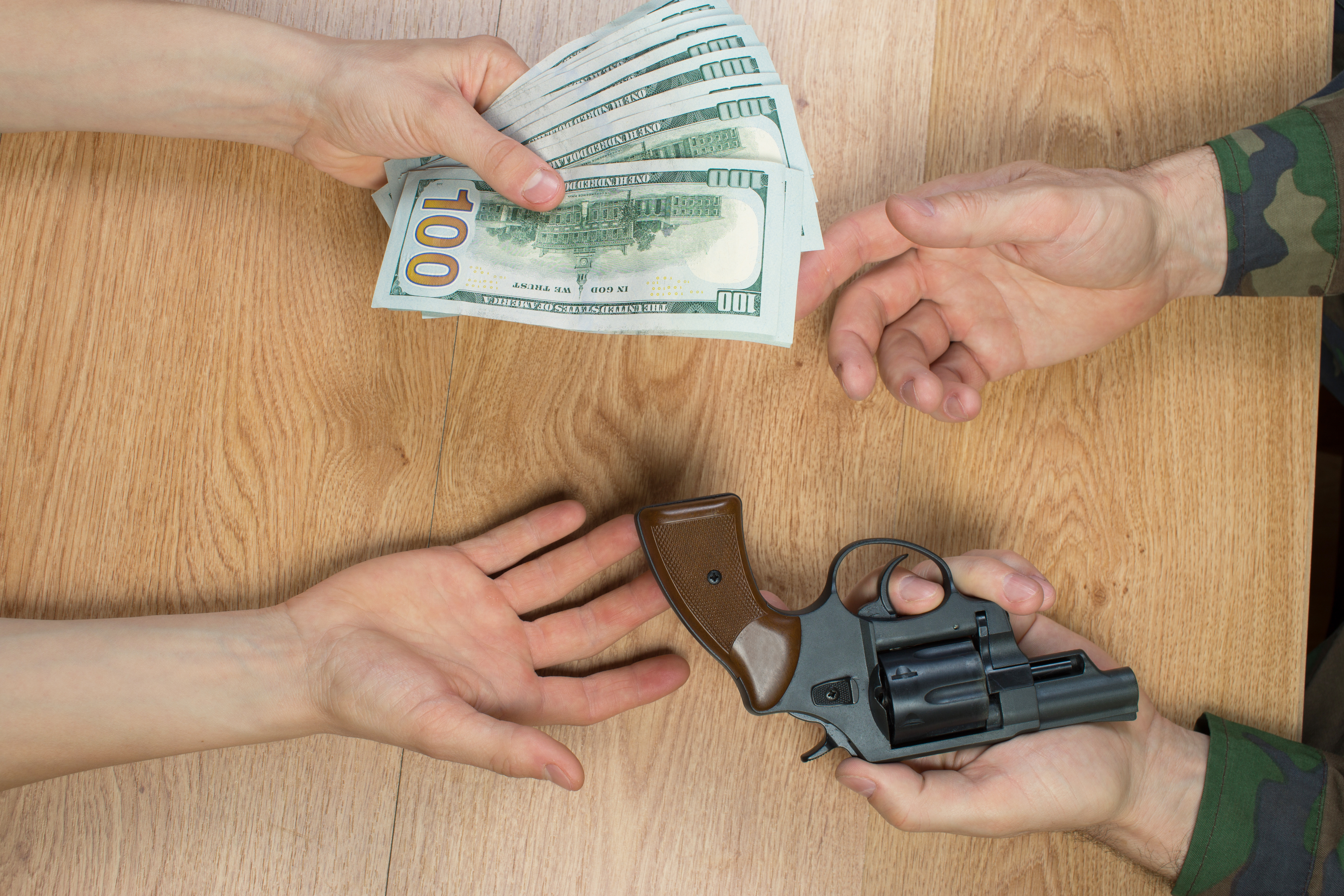Criminal Law -Common Gun Crimes Pennsylvania and New Jersey
Our Philadelphia Criminal Defense Law Firm represents persons charged with different illegal gun and firearm offenses in Pennsylvania and New Jersey. While many would agree that New Jersey maintains much harsher gun laws than Pennsylvania, it is extremely important to always treat an illegal firearms with extreme care. In addition to a potential state prison sentence in either jurisdiction, illegal weapons offenses are most always characterized as felony as opposed to misdemeanor offenses. I have written on many previous occasions that there is a substantial difference between a felony and misdemeanor offense.
While I’ve written articles about ways to challenge a gun charge focused on reasonable suspicion, probable cause, as well as actual and constructive possession this article focuses on the most common gun charges in Pennsylvania and New Jersey. Watch my videos on gun crimes as well!
What Are the Most Common Gun Crimes In Pennsylvania?
The most common gun charges in Pennsylvania are Violations of Section 6105, Section 6106, and Section 6110.2 of the Uniform Firearms Act (Title 18, Chapter 61, Section 6101). Section 6105 is the possession of a firearm by a person prohibited by law. Section 6106 is the possession of a firearm by a person without a license. Section 6110.2 is the possession of a firearm which has an obliterated or altered manufacture’s serial number. Section 6108 (Illegal carrying a gun or firearms on the Streets of Philadelphia) is a Misdemeanor Offense.
What Are the Most Common Gun Crimes In New Jersey?
In New Jersey, illegal gun and firearm crimes are what is known as indictable offenses in the Garden State. The most common offenses that our firm handles are 2C:39-4—Possession of a Weapon for an Unlawful Purpose, a crime of the second degree and 2C:39-5—Unlawful Possession of Weapon. Read my prior blog on New Jersey’s Grave Act for more information, especially mandatory minimum sentences
As I've written in previous articles, New Jersey’s Graves Act carries with it a number of sections which require the court to impose a mandatory minimum 42 month state prison sentence if the individual is convicted. (The maximum punishment for a crime of the second degree in New Jersey is 10 Years in state prison). There are a number of offenses which our law firm typically encounters during our representation of accused individuals in the Garden State. These offenses include the following:
- 2C: 39-4—possession of a weapon for unlawful purposes
- 2C: 39-4.1—possession of a weapon while possessing controlled dangerous substances (CDS)
- 2C:39-5—the unlawful possession of a weapon.
You Need A Permit to Possess A Handgun or An Assault Rifle In New Jersey But Not in Pennsylvania!
I have written articles on these criminal offenses and I encourage you to take a look at them. The unlawful possession of a weapon under 2C:39-5 list a number of firearms, which in and of themselves create criminal violations by their mere possession without a permit. This is substantially different from Pennsylvania, where our criminal defense law firm also represents accused person charged with offenses under the Commonwealth’s Uniform Firearms Act.
The firearms in section 39-5 (unlawful possession) include the following:
- Machine guns – 39-5 (a)
- Handguns – 39-5 (b)
- Rifles and shotguns 39-5 (c)
- Assault rifles 39-5 (f)
Again, New Jersey, unlike Pennsylvania, requires an individual to obtain a permit to possess an assault rifle or a handgun. This means that a person can’t simply purchase one of these weapons without first obtaining a permit to do so. In addition to obtaining a permit, a person must also obtain a firearms purchaser identification card in accordance with NJS 2C: 58-3. I have written previous articles on how to obtain a handgun in New Jersey and I encourage you to read it for more information
Other Weapons Offenses in New Jersey
The New Jersey Code of Criminal Justice contains three (3) classes of possessory weapon offenses. The first pertains to the mere possessing of certain weapons which constitute a “per se offense”. A sub category of this class pertains to weapons or firearms which are still crimes, unless the defendant can present a lawful explanation as to the purpose of that possession.
The following devices are strictly prohibited in New Jersey:
- Destructive devices (crime of the third degree)
- Any instrument or object designed to explode or produce uncontrollable combustion
- Sawed off shotgun (crime of the third degree)
- Any shotgun having a barrel or barrels less than 18 inches in length measured from the breach to the muzzle.
- Firearm silencer (crime of the fourth degree)
- Any instrument causing the lessening or muffling of the noise of the firing of any gun, revolved, pistol, or other firearm.
- Defaced firearms (crime of the fourth degree)
- Any defaced firearm means any removable, covering, altering, or destroying the make, model, or designation or distinguishing serial number of a firearm
How does New Jersey classify criminal offenses?
Unlike Pennsylvania, New Jersey, classifies crimes from first to fourth degree offenses. A first degree offense carries potential 10-20 years in prison. A second degree offense carries a potential 5-10 year prison sentence and a third degree crime can result in up to 3-5 years of prison. Fourth degree crimes carry a potential penalty of 18 months in prison but there is a presumption of non-custodial sentences (no prison) on third and fourth degree crimes in New Jersey.
All of these offenses are heard in New Jersey’s Superior Court (trial court) and are more serious than non-criminal charges heard in the New Jersey’s Municipal Courts. Municipal Courts handle “disorderly person’s offenses” or “petty disorderly person’s offenses”. A disorderly person’s offense can result in up to 6 months in a county jail while petty disorderly offense can require a person to serve up to 30 days in jail.
Here are some examples of degrees of crime in New Jersey:
- First degree crimes – murder, manslaughter, and rape.
- Second degree crimes- aggravated assault, illegal guns (Graves Act), burglary, kidnapping, and some drug crimes.
- Third degree crimes – some robberies, some drug crimes, and even some DWI.
- Fourth degree crimes – some aggravated assaults, some sex offenses, drug possession, some theft crimes (valued between $200 and $500).
Please keep in mind that many offenses in New Jersey aren’t confined to a specific degree. Aggravated Assault, for example, can be a 2nd, 3rd or even a 4th degree offense depending on the circumstances surrounding the incident.
Pennsylvania Does Have Mandatory Minimum Gun Crimes
Unlike New Jersey, the majority of Pennsylvania Uniform Firearm’s Act, none of them carry with them a mandatory minimum sentence except section 6111(g)(2)—the illegal sale or transfer of a gun or firearm to an unauthorized or unqualified person.
Under Section 6111 (g)(2), any person, licensed dealer, licensed manufacturer or licensed importer who knowingly or intentionally sells, delivers or transfers a firearm under circumstances intended to provide a firearm to any person, purchaser or transferee who is unqualified or ineligible to control, possess or use a firearm under this chapter commits a felony of the third degree and shall in addition be subject to revocation of the license to sell firearms for a period of three years.
6111(h)(1) explains the penalty for a violation of section 6111(g)(2) and the mandatory minimum sentencing portion of it. This section was created following the death of Police Officer Bradley Fox and is sometimes referred to as the “Brad Fox Law.” Specifically, for all second or subsequent violations the person faces a 5 year mandatory minimum for each transfer:
How Do Pennsylvania Judges Determine a Sentences For Gun Crime Convictions?
While all of these charges are serious felony offenses in Pennsylvania, they vary with regards to the harshness of the criminal consequence following a conviction. While some people may believe that a judge randomly chooses a sentence following a plea or a trial, Pennsylvania, like most states, maintains sentencing guidelines based on offenses and a person’s prior criminal history. The Pennsylvania sentencing matrix is a table which judges utilize prior to sentencing a criminal defendant. While a judge isn’t bound by sentencing guidelines, most will give sentences within those guidelines to avoid an improper sentence appellate issue.
What Is The Pennsylvania Sentencing Matrix?
The sentencing matrix is divided into a horizontal and vertical axis. The vertical axis is based on the offense gravity score (OGS) of a crime and the horizontal axis is based on a criminal defendant’s prior record score (PRS). With regards to gun crimes, the OGS varies from as high as a 10 to as low as a 2 for certain misdemeanor firearm offenses. Violations of Section 6105 can range from as high as a 10 to as low as a 4. Violations of Section 6106 can range from as high as a 9 to as low as a 3. Violations of 6110.2 can vary from a 10 to a 9. The range of the OGS depends on the circumstances surrounding a person’s arrest and whether or not the gun was loaded at the time of that arrest. The higher the OGS, the more of a severe sentence a criminal defendant faces following a conviction. For example, the guidelines for a first time offender convicted of a gun crime with an OGS of 10 are 22-36 months and 12-24 months for an OGS of 9. A gun crime with an OGS of 3 however faces restorative sanctions to 1 month in jail which more than likely means probation.
The guidelines increase from that point and a person with a prior felony or even multiple misdemeanor conviction in some cases faces a higher criminal penalty. For example, a person with a gun conviction with an OGS of 10 and a prior conviction for another gun crime or a prior possession with the intent to deliver could face 42 to 54 months instead of 22 to 36 months for that same offense.
What Is The Deadly Weapon Enhancement For Gun Crimes In Pennsylvania?
These standard sentencing guidelines, however, don’t take into account the deadly weapon sentencing enhancement which District Attorney’s frequently argue for following a conviction and I encourage you to read that article on this topic. In addition to sentencing guidelines based on OGS and PRS, the sentencing matrix also includes mitigation and aggravation ranges which judges must take into account prior to imposing a sentence. Mitigation and aggravation can increase or decrease sentencing guidelines by as much as a year depending on the amount of mitigation a defense attorney provides to a judge.
Gun and firearm charges are serious in New Jersey and Pennsylvania and for more information on this important topic I encourage you to read my book and subscribe to my monthly newsletter which provides more information and criminal defense strategies on this subject.



